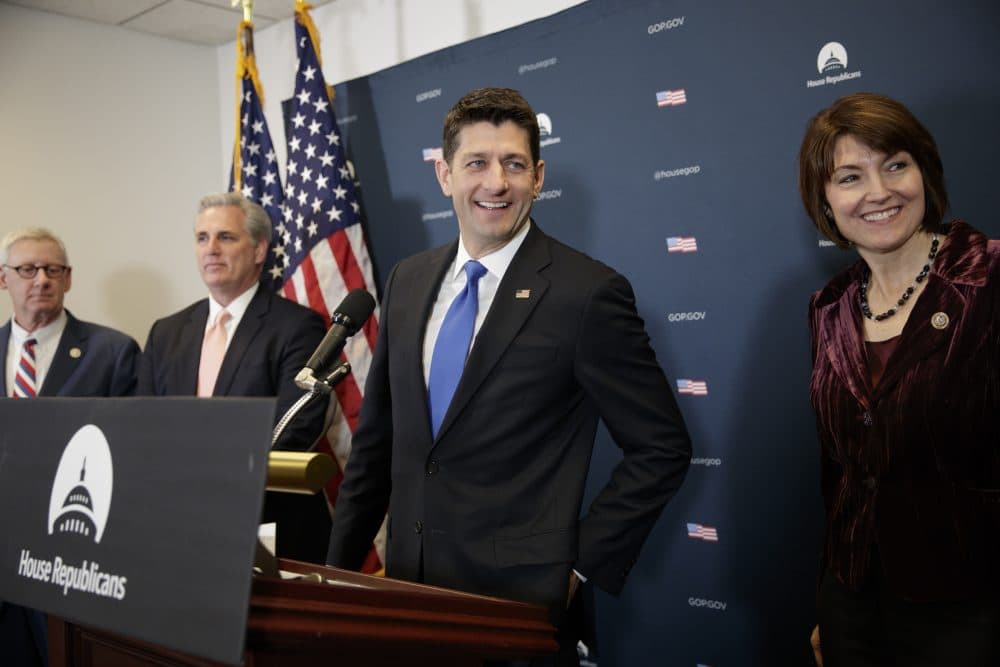Advertisement
Key Obamacare Architect And A Former Insurer Assess The GOP Health Care Replacement Plan
Resume
The GOP finally unveiled its own health care reform package on Monday. The American Health Care Act would preserve some popular aspects of the health reform passed under President Obama, but the Republican plan would also make some sweeping changes.
Key House committees are scheduled to vote on the new plan Wednesday.
On Tuesday, leading Republicans now tasked with selling the bill went full court press. Here, for instance, is Oregon U.S. Rep. Greg Walden decrying the current health care marketplaces set up under Obamacare.
This insurance market is collapsing before our eyes. The CEO of Aetna says it's in a death spiral. Those aren't our words, those are his words, and he's in that market. The facts of the matter are not what this will or won't do going forward. The facts are, we've arrived at the scene of a pretty big wreck and we're trying to clean up the mess, and if we don't intercede now, fewer people will have access to insurance. Period.
We take stock of the new plan with two Massachusetts health care leaders.
Guests
Jim Roosevelt, a former CEO of Tufts Health Plan from 2005-'16 and now counsel at Verrill Dana LLP.
Jonathan Gruber, professor of economics at MIT, one of the architects of Massachusetts landmark health care reform law, and a senior adviser to President Obama on the Affordable Care Act.
Interview Highlights
On their first reactions to the bill
Gruber: "It's not clear why we need this. I mean essentially what this bill does is take from the sick, the poor and the elderly, and give to the wealthiest 2 percent of Americans. And it's not clear why anyone besides those wealthiest 2 percent should be in favor of this law. I just feel like as Paul Krugman said today, it's Obamacare 0.5 ... it's a step backwards not a step forward."
Roosevelt: "I'm going to be the cup half full person this time and say ... if you put aside the meaningless rhetoric about Obamacare melting down or being a disaster, which just isn't true, what this bill does is it acknowledges that access to health care and access to health care coverage has been recognized as a right in America. And that was never true before Obamacare. What it does is, and John's right about this, it makes cuts in funding and changes, and changes terms so that there is less coverage and there is less tax on the wealthy. So the fundamental principle is I think preserved, and that's the great victory of the Affordable Care Act. I think we need to have a lot of debate about the specifics in the language of this bill."
On how the new scheme for tax credits might change costs for people
Gruber: "What you have as a comparison between a set of income-based tax credits under Obamacare that were designed to ensure insurance affordability, versus essentially just a tax cut under the Republican plan that doesn't really do much for insurance affordability.
Let's do a specific example. Take a 59-year-old who earns $16,000 a year. Under Obamacare, that person would have to pay for insurance about $500 a year, about 3 percent of their income. Under the Republican alternative, they would pay something like $6,000 or $7,000 a year, or something like 40 percent or more of their income.
So essentially, you've just got a situation where you're giving a flat amount that doesn't do anything to ensure affordability for the lowest earning Americans. Meanwhile, you're giving a tax break to young and healthy people in the middle class who don't really need it to afford insurance. It's a nice tax break. But if you want to give a tax break, just give a tax break. There's no need to mess with the success of affordable insurance to make that happen."
Roosevelt: "Those calculations sound correct to me ... What this does is it makes health insurance more expensive, particularly for Americans below the Medicare eligibility age, but still older members — who may or may not still be in the workforce — and it significantly reduces the government's commitment to adequate health care coverage for those who are eligible for Medicaid such as such as MassHealth."
On the proposal to get rid of the individual mandate
Gruber: "The problem is that if you take away the individual mandate, you don't just offer a choice to a healthy person, you raised the price paid by a sick person. Remember we ran this experiment in Massachusetts. If you try to end insurance discrimination without the individual mandate, you cause the healthy to exit the market and the sick pay exorbitant prices. So it's not just about individual freedom. It's about making the insurance market work for the healthy and the sick."
Roosevelt: "This plan, which increases premiums when you decide you absolutely need insurance, first of all, it raises premiums because you have sicker people in the pool, on an ongoing basis, that raises premiums. Then it raises the premiums again for the sick person who buys the insurance, and it punishes them for past actions instead of giving them an annual choice when they could maybe figure out what the best most prudent thing for themselves would be. So it's really a very counterproductive way to approach things."
On if Massachusetts residents may lose coverage
Gruber: "I think [Massachusetts residents] will certainly see a reduction in the generosity of their coverage, and that could result in the loss of coverage."
Roosevelt: "I still hope that the waiver that was agreed to in the last months of the Obama Administration, that provides additional flexibility and funding for Massachusetts, will stay in place. Prior administrations have always — before the Trump Administration — have always honored the commitments of previous presidents on these waivers. Who knows what's going to happen under President Trump."
This article was originally published on March 07, 2017.
This segment aired on March 7, 2017.


